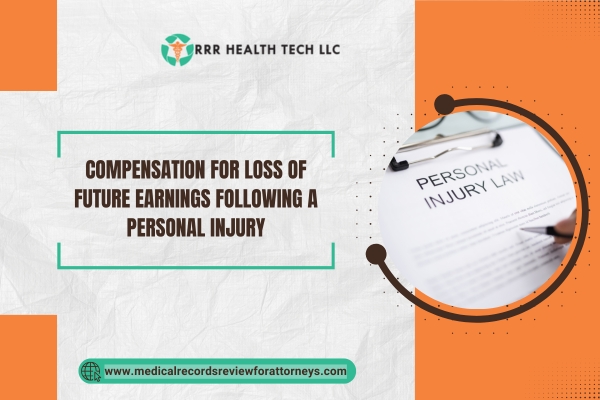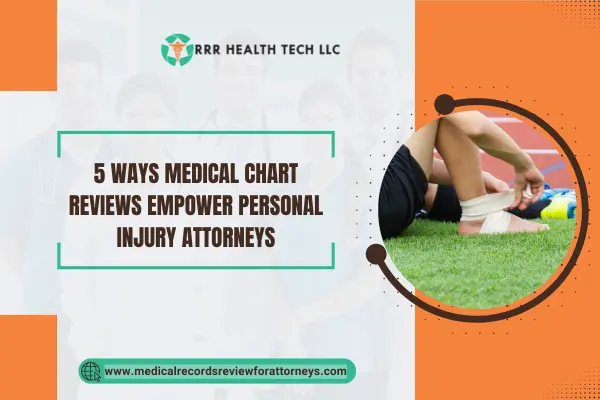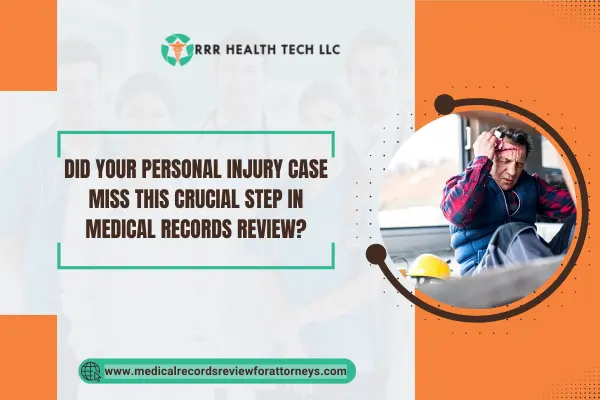
Personal injury can be a painful experience by itself but even then, compensating yourself legally can be quite a tedious procedure. Following a personal injury, one important area that needs to be addressed during the compensation process is loss of future earnings. In this article, we will go into great detail on how medical records review services can help American attorneys build a strong case for their clients and explore this concern in greater detail.
Understanding Loss of Future Earnings
In employment terms, loss of future earnings is the loss of wages and other benefits suffered by a person who is injured as a result of the incident. This covers the entire scope of the injury; how much you would have earned if you had not sustained the injury instead of just taking into account how much you might have lost while being injured.
- Definition: It includes income loss in terms of reduction in work capability and change in one’s occupation after an injury has occurred
- Importance: For people who wish to pursue a personal injury claim, being able to do an accurate calculation of this loss is essential as it serves the purpose of fair compensation.
How Loss of Future Earnings is calculated
Calculating loss of future earnings involves several steps and considerations:
- Professional Assessments: Professional Evaluations are done via hiring vocational and financial specialists for determining the potential cost of lost earning capabilities due the injury.
Factors Considered:
- Age: Long-term losses could be greater for applicants who are younger.
- Profession: The scope of the work and the level of exertion required are crucial.
- Skills and Qualifications: A university education plus expertise may assist in alleviating expected losses.
Key Calculation Methods
- Analysis Of Past Earning Patterns: Evaluation of the previous earning to help formulate earnings of the future.
- Salary Forecast: This will take into account the prevailing economic conditions as well as the estimated salary increases over time.
- Adjusting Earnings to Inflation: Present value of future earnings will be adjusted with inflation in order to reflect them accurately.
Types of Injuries Leading to Loss of Future Earnings
Certain injuries are more likely to result in significant future earnings loss:
- Traumatic Brain Injury (TBIs): Impairment of thinking processes and job availability will be greatly restricted.
- Spinal Cord Injury: Tends to cause bodily restriction and hence which limits employment opportunities.
- Amputation: This alters someone’s body functioning and necessitates changes in their occupation.
Proving Loss of Future Earnings in a Personal Injury Claim
To substantiate a claim for loss of future earnings, robust evidence is essential:
- Medical Histories: These notes by medical practitioners give detailed long-term effects of the injury.
- Employment Histories: Such figures show data pertaining to previous earnings and vertical movement within the labor market.
- Professional opinions: Information from professionals about how the injury is likely to affect one’s future ability to generate income.
The Role of Medical Records Review
Medical records review companies play a vital role in this process by:
- Ensuring Accuracy: Verifying that medical documentation accurately reflects the injury and its implications.
- Streamlining Evidence Gathering: Assisting attorneys in compiling necessary documentation efficiently.
Factors Influencing the Value of Loss of Future Earnings Claims
Several elements can affect the compensation amount for loss of future earnings:
- Fault Allocation: Comparative genesis of Indiana shows the degree of fault determining extent of compensation.
- Salary Increase Opportunities: Promotion opportunities after an injury may not occur so affect future earnings.
- Physical and Mental Disability: Career shift necessitated by injuries ususal leads to lower paying jobs.
Non-Economic Damages and Their Relation to Future Earnings
In addition to loss of future earnings, claimants may pursue non-economic damages, which address the broader impact of injuries:
- Pain and Suffering: Money awarded people for heightened emotional and physical stress and also their deep regret.
- Loss of Enjoyment of Life: The pain inflicted by the injury on activities including social interaction and other communicative relation to such activities.
Expert Legal Support for Compensation Claims
Engaging with experienced personal injury attorneys is crucial for navigating the complexities of compensation claims. They can provide:
- Free Consultations: Initial assessments to evaluate the potential value of a claim.
- Expertise in Medical Records Review: Leveraging medical records review services to strengthen the case.
Case Studies
Case Study 1: John’s Traumatic Brain Injury
• Overview: John is a 30 year old construction worker who suffered TBI while at the work place.
• Challenges: The traumatic injury which he suffered caused difficulty in thinking leading him not to able to go back to work as a construction worker.
• Solutions: Analysis of medical records showed the damages he suffered thus establishing the types of economic losses he would sustain for not working.
• Compensation: The amount agreed upon was capable of covering a loss of earned income and earnable capacities on the finances.
Case Study 2: Sarah’s Spinal Cord Injury
- Overview: Sarah, 26 years old athlete, got hurting spinal cord in a vehicle accident.
- Challenges: The damage has restricted, so she quitted her sports career and became a normal person.
- Solutions: They also provided medical records of the sports she was practicing and details of the surgery to reconstruct her breasts, which was also done 8 years ago.
- Compensation: The compensation that Sarah received covered future earnings loss as well as non-economic damages including pain and emotional suffering due to her spinal cord injury.
Conclusion
The analysis of the loss of future earning capacity is a pivotal argument in negotiations in order for a higher settlement to be attained. With the help of medical review services, lawyers are able to calculate how a particular injury statement would reflect on someone’s finances in the long term, and this is likely to improve their overall strategy. Such an approach assists not only in determining potential losses but also in demonstrating all necessary evidence.


